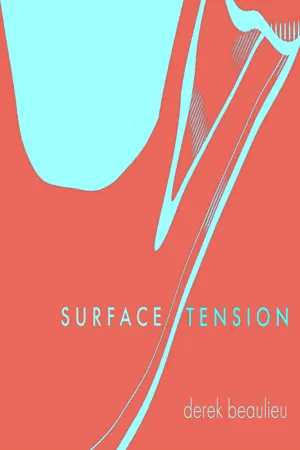Surface Tension
About this book
Typography meets poetry at a Pink Floyd laser-light show
In Surface Tension, poetry is liquefied. Flowing away from meaning, letters and words gather and pool into puddles of poetry; street signs and logos reflected in the oily sheen of polluted gutters of rainwater. Like a funhouse mirror reflecting the language that surrounds us, the pages drip over the margins, suggesting that Madge was right, we are "soaking in it!"
Surface Tension updates visual poetry for our post-pandemic age, asking us rethink the verbiage around us, to imagine letters as images instead of text, to find meaning in their beautiful shapes as Beaulieu stretches, torques, slides, blurs, and melts them into Dali-esque collages.
"Not words, letters; not letters, shapes; not shapes, figures; not figures, ciphers; not ciphers, ornaments; not ornaments, decoration; not decoration, semiotics; not semiotics, communicative possibilities; not vagrant potential, slowly forming inflection; not melting deflection, language as dance: in, out, upside down, flapping, flipping, all ways round." – Charles Bernstein, recipient 2019 Bollingen Prize for American Poetry
"The striking compositions you'll find in Surface Tension are being presented sequentially in book form, yet that they wouldn't be out of place hanging on the wall goes without saying. Beaulieu swerves Gomringer when writing that 'Readibility is the key: like a logo, a poem should be instantly recognizable...' yet, to this reader, these works merit sustained and enthusiastic viewing precisely because they teeter on the edge of legibility. The kinetic, glitchy quality of their 'alphabetic strangeness' keeps them unrecognizable as poems and, here, 'that is poetry as I need it,' to quote Cage. Think of them as anti- advertisings selling you nothing but bountiful manifestations of the irreducible plasticity of numbers, punctuation marks, and letter forms. No logos." – Mónica de la Torre, Madelon Leventhal Rand Endowed Chair in Literature, Brooklyn College; co-editor of Women in Concrete Poetry 1959–1979
"With his distinctive visual palindromes and angled axes of symmetry, Derek Beaulieu has developed a signature mastery of Letraset, leveraging the twentieth-century tech- nology as a vehicle for bring concrete poetry into the twenty-first century. With Surface Tension, Beaulieu takes the possibilities of that new idiom even further, unsettling the fixity his symmetries once reinforced and dislodging the set in Letraset as poems distort in fun-house-mirror swerves, sag as if under their own weight, pool and smear in the liquid logic of heated ink, or swoop and blur as if in motion. In the process, these poems make visible the filmic potential of the photocopier, the facture of abraded transfers from brittling stock, and the three-dimensional substrate of the page with its flexible bends in curving space. These are thus poems in part about their own modes of production. They are beautiful products of a self-aware and intelligent process." – Craig Dworkin, author of Radium of the Word: A Poetics of Materiality
"When most of the language we consume is non-poetic, should poetry not attempt to poetically intervene within these spaces that are not traditionally poetic?" The answer to Derek Beaulieu's question, put forward in his beautiful essay, is surely yes: the ten bril- liantly adventurous visual poems in his Surface Tension make a startling case for his fascinating Letraset /photocopier inventions. Beaulieu's compositions originate in a place of clean design and logical narrative; soon, as in a dream, they open up, ushering in what he calls 'a poetry of difference, chance, eruption.' Marcel Duchamp would have called it the poetry of the infrathin: watch 'Simple Symmetry' or 'Dendrochronology' open up and come alive in their minutely evolving new spaces. This is quite simply an enchanting book – a book producing new pleasures with each turn of the page." – Marjorie Perloff, Sadie Dernham Patek Professor of Humanities, Emerita, Stanford University
Tools to learn more effectively

Saving Books

Keyword Search

Annotating Text

Listen to it instead
Information
Table of contents
- Cover
- Title
- Copyright
- Contents
- Kursiv
- Performance Adjustment / Appeal Process
- Madge, you’re soaking in it
- Euphemia Asleep
- Form is never more than an extension of content
- Simple Symmetry
- Ampersandance
- All that signifies can be sold
- Circuit
- Fafnir
- Type is what meaning looks like
- Circuitbreaker
- Page Break
- A poem should not mean
- Dendrochronology
- Acknowledgements
- About the Author
Frequently asked questions
- Essential is ideal for learners and professionals who enjoy exploring a wide range of subjects. Access the Essential Library with 800,000+ trusted titles and best-sellers across business, personal growth, and the humanities. Includes unlimited reading time and Standard Read Aloud voice.
- Complete: Perfect for advanced learners and researchers needing full, unrestricted access. Unlock 1.4M+ books across hundreds of subjects, including academic and specialized titles. The Complete Plan also includes advanced features like Premium Read Aloud and Research Assistant.
Please note we cannot support devices running on iOS 13 and Android 7 or earlier. Learn more about using the app
